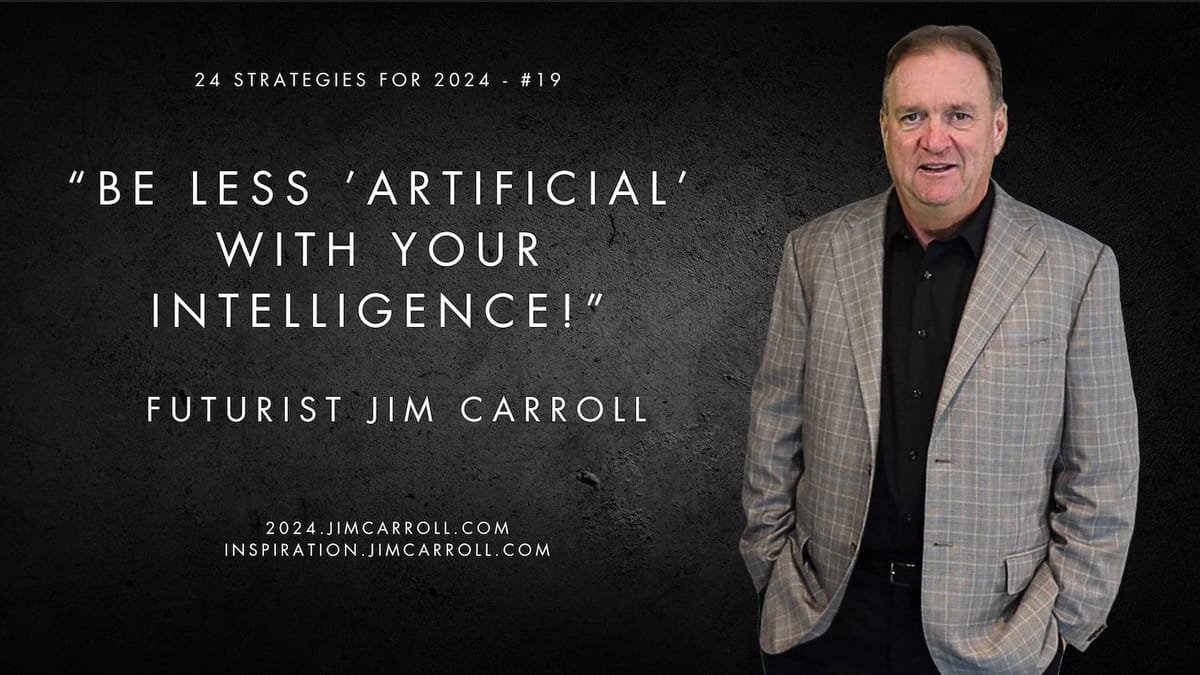Futurist Jim Carroll is running a series that began November 27, 2023, and will end on January 1, 2024 - '24 Strategies for 2024.' Rather than running a trend series for the upcoming year as he has previously, this series will examine a number of his personal beliefs on how to best align yourself with the future. There will be a post each weekday, excluding weekends and holidays, until the series runs its course. You will find it on his blog at https://blog.jimcarroll.com or https://2024.jimcarroll.com
AI is exciting.
And right now, when it's being used, it's also often pretty obvious.
That's why, as we step further into the age of artificial intelligence, it's crucial to remember the irreplaceable value of human creativity. While AI offers efficiency and analytical precision, it often falls short of capturing the nuanced warmth and emotional depth inherent in human expression. A paragraph penned by AI might tick all the technical boxes, but it lacks the spontaneous sparks of inspiration, the personal touch of lived experiences, and the subtle, yet profound, understanding of human emotions that come naturally to a human writer. This gap reminds us to embrace our unique human abilities – to think, feel, and create in ways that machines cannot replicate. In a world increasingly intertwined with AI, let's not overlook the beauty and power of our creative minds, ensuring that the essence of artistry and emotional depth remains a distinctly human endeavor.
Written by me, or an AI? ChatGPT.
When you read it, it seems pretty obvious, doesn't it? To my mind, it does. This is the prompt I fed the machine:
I am writing an article on how people should be cautious in their use of AI, trying to make the point that they should rely on their own creativity. The point is that at this point in time, a paragraph written by an AI might lack the creativity, warm, and human emotion that might come when written by a human. Can you write a paragraph that makes this point?
I really can't disagree with the nuance of what the AI offered up - and I can certainly agree that the paragraph seems to lack the spark of inspiration, personal touch, and subtle, profound clues of human thought. To me, it seems sterile, flat, dull.
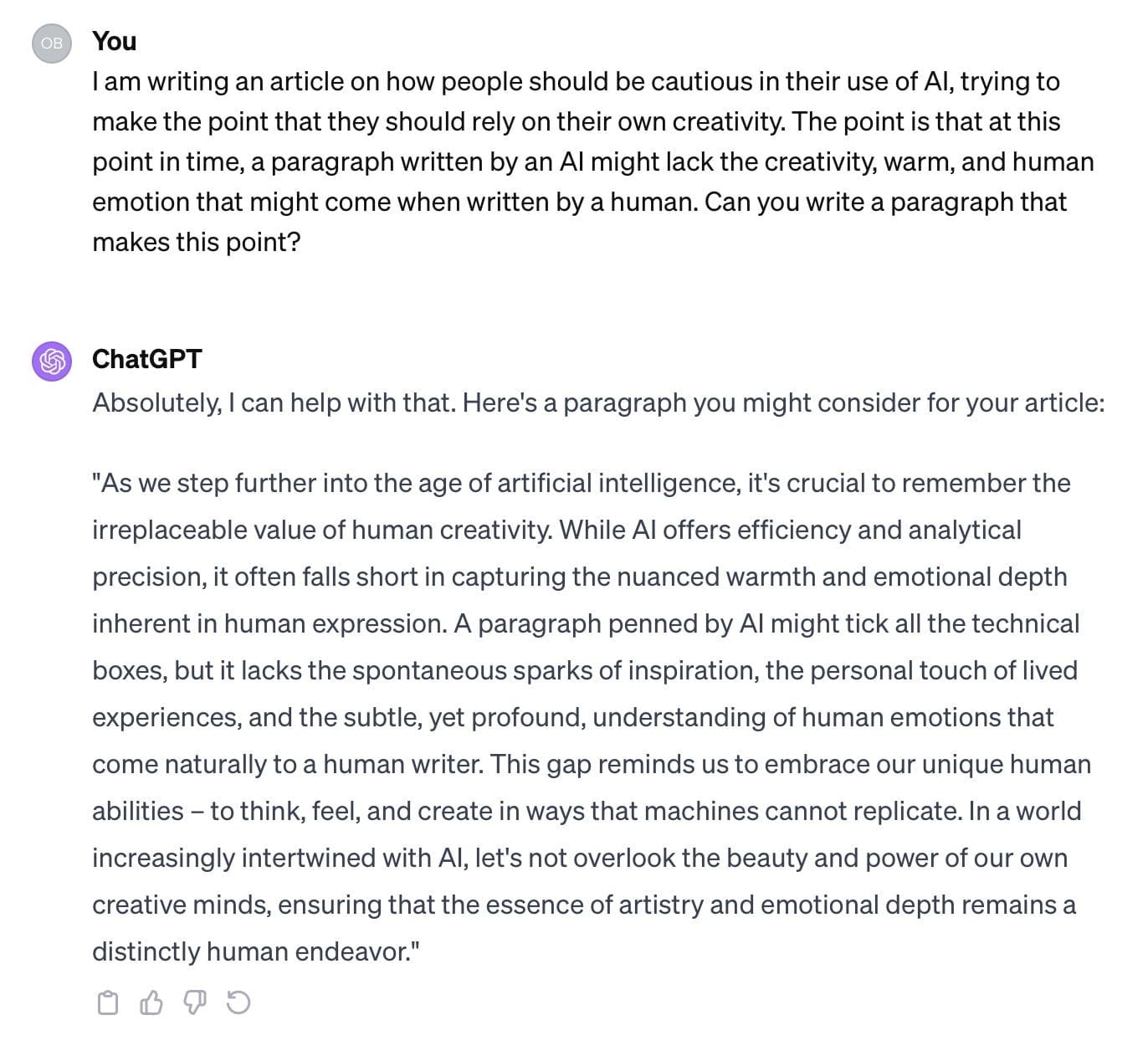
You will know of the Turing test- that's the famous test proposed many years ago that suggests that we will know when the future of AI has truly arrived - it's when a machine's ability to exhibit intelligent behavior is equivalent to or indistinguishable from, that of a human. Talk of the test is all the rage right now, as we know we have witnessed stunning advances with AI in the last year. Some believe we are there with the Turing test, and others would argue the opposite. We know that large-language models are displaying amazing things - excelling at medical tests and other forms of human knowledge scoring; in the generation of stunning works of art, both images and video; the ability to proper computer code without error.
But are they creative? Do they display a human soul?
To me, what's missing in all these discussions is - is the warmth there? More importantly - will using these tools help you to enhance your top 'soft skills' - the critical set of capabilities that you need to get by in today's complex world? Maybe not - and that's why this is strategy #19 of my 24 Strategies for 2024 series. It seems like a worthy point of debate.
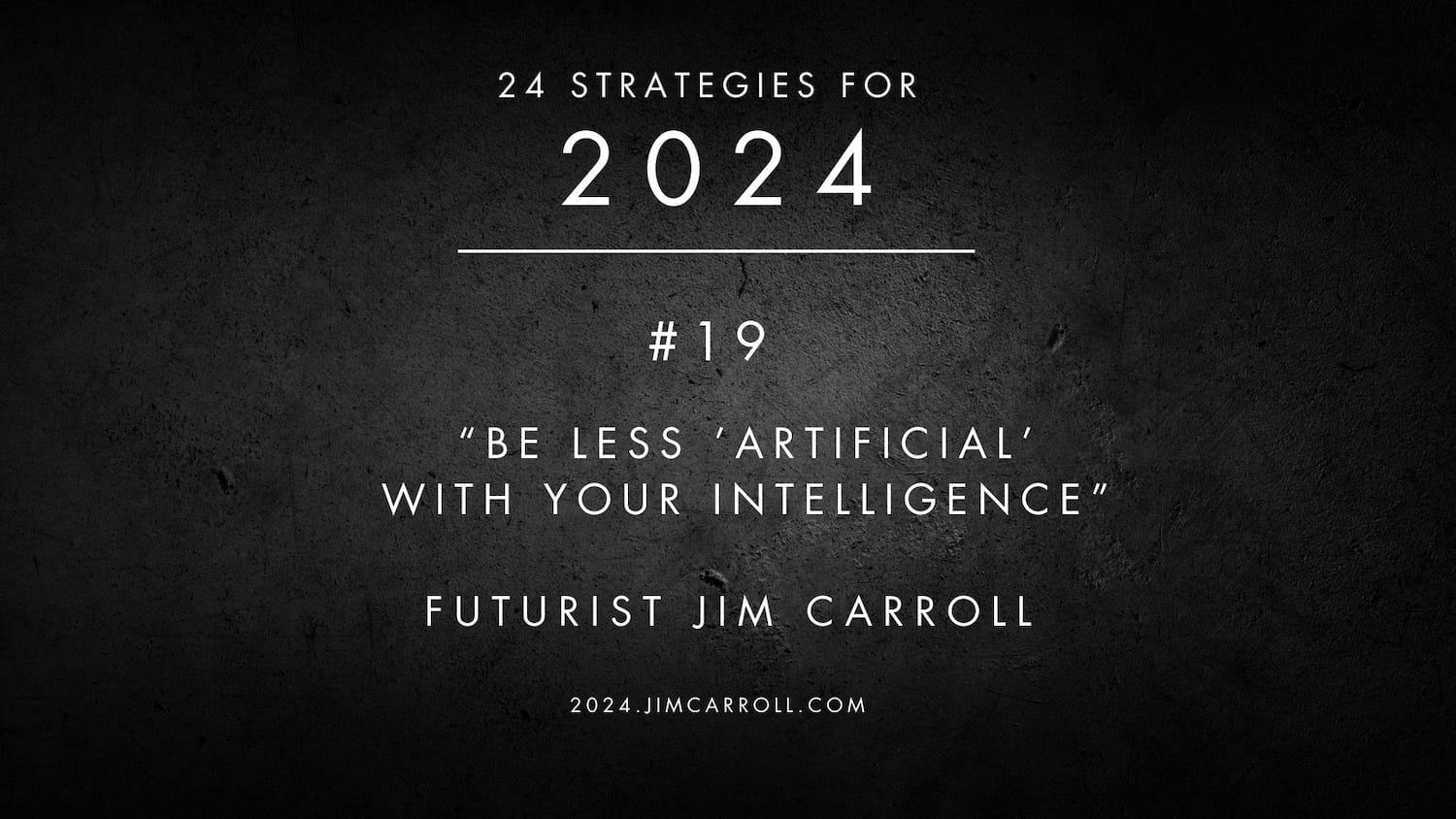
Think about it: if you spend any time speaking, writing, or thinking about issues of leadership, inspiration, and HR management you'll be familiar with the idea of 'soft skills.' There are millions of pages devoted to the topic online, as people work to emphasize that it's not just your technical and career skills that are important - it's all the other stuff that is equally critical, if not more so. You can find these lists in any shape, form, or derivation; such as this list of soft skills for those who work in the world of technology
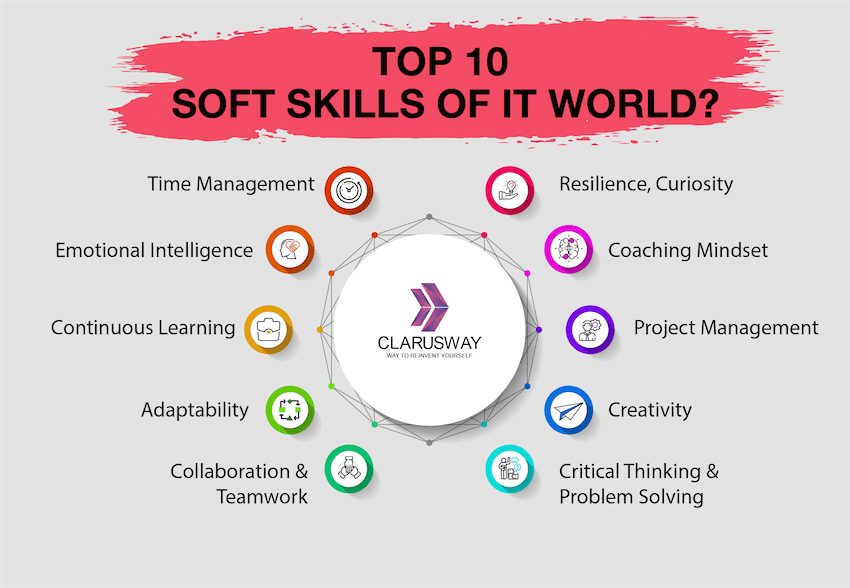
These lists share a commonality - what is important is collaboration, teamwork, learning ability, curiosity, and ... creativity. Even the World Economic Forum weighs into the topic, publishing a list of core skills. Check #2 - creativity.
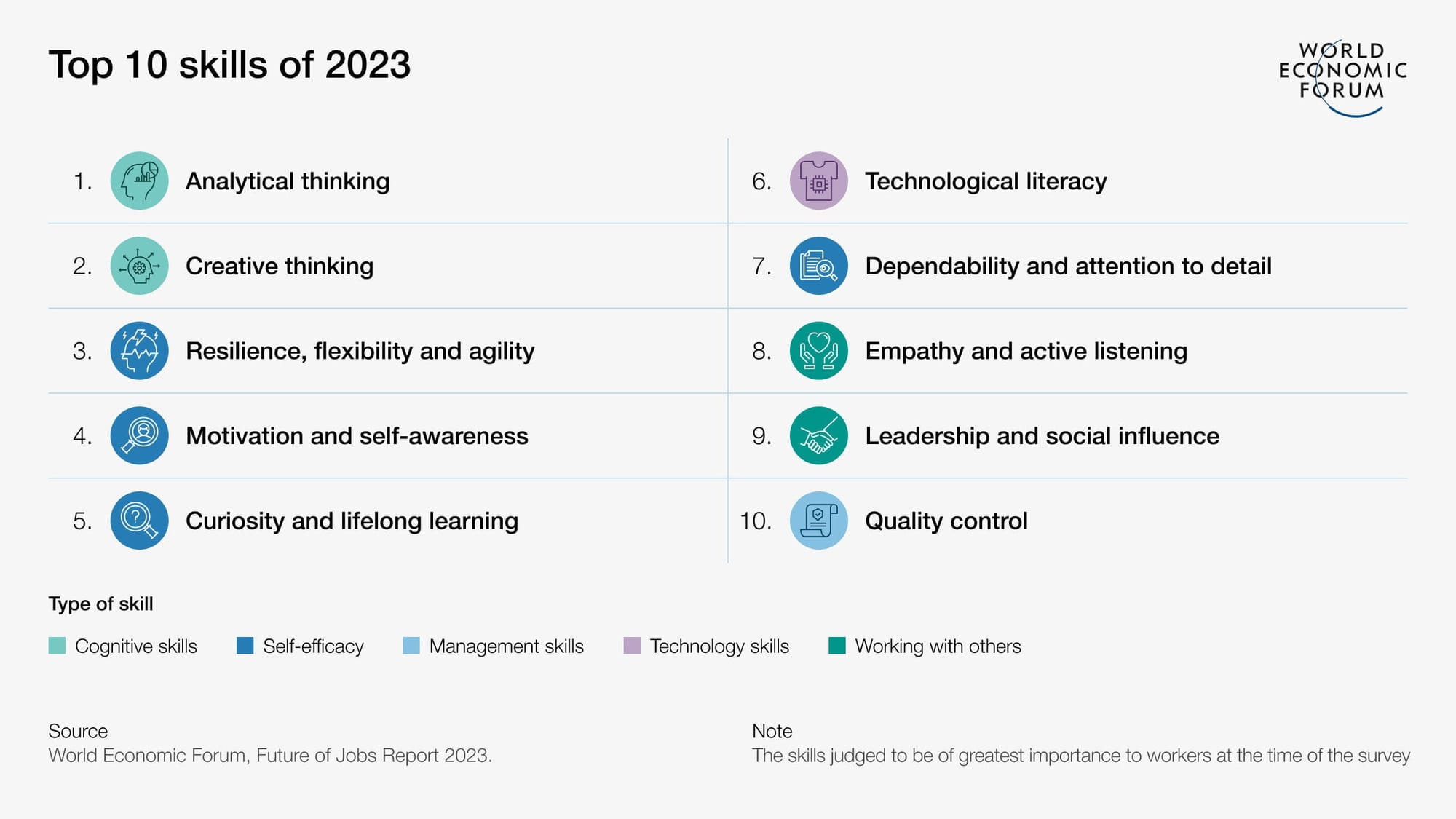
These skills aren't the type of thing you can easily learn or pick up - these are skills that are developed through learning, making mistakes, trying new ideas, and applying yourself. And yet, they are critically important.
Enter AI. On any list of soft skills, the issue of 'creative thinking' is paramount - and yet we have to wonder if we risk diluting our creative skills through its overuse; if we might hold back our core creativity capabilities while we explore new ones based on AI; or whether we might short circuit our development of this and other critical soft skills as we become overly reliant on the 'machine.' I think I've already developed the skills to instantly spot AI-generated content; a resume that has been crafted through ChatGPT; or a LinkedIn post that is obviously from the machine. I believe overreliance on AI does more disservice to the author than they realize - more importantly, it might hinder our creativity. Finding the balance will become critical - and that's a strategy for 2024. Be less artificial in your use of the intelligence - because the artificiality is so, so evident.
Our time today echoes the early days of the arrival of other new forms of technology - we are excited to learn about them, share what we have learned, and figure out how we can introduce them into our lives. And yet, we often fail to think as to whether we really should be doing this. (I am just as guilty as many in this regard!)
Consider this: when Microsoft first released Windows, it came with MSPaint, a marvelous little program that let people generate creative works of art. While primitive in its capabilities, it offered potential and promise with a new form of creativity; it was a stunning new idea that for many, opened up tomorrow. And yet, a lot of people (including me) used it to create some horrid designs. It didn't help us to do anything creative at all - it merely helped us to accelerate our inability to do anything creative at all with the graphic arts. It was so stunningly anti-creative that today, there are entire online communities that have fun using it to point out how stunningly anti-creative it was.
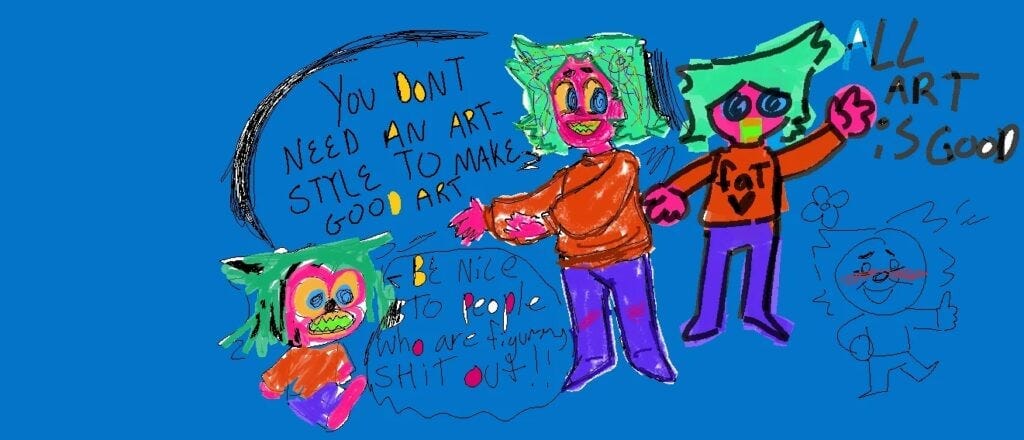
We risk repeating the same mistakes
Because, as we know, as contemporary entities engage with the burgeoning influx of AI-driven creative instruments - encompassing AI art, textual composition, conceptual ideation, collaborative frameworks, and temporal organization - it becomes evident that these tools are imbued with formidable potency, captivating intrigue, and an abundance of latent promise and potential.
However, it necessitates a critical self-inquiry: Do these technological advancements augment our integral soft skills, or conversely, do they pose a potential impediment to their development?
Oh - sorry! I meant to say: that we run the same risk today as we encounter a flood of new creative tools with AI - art, writing, concept and idea generation, collaboration, time management, and more. They are all extremely powerful, wonderfully fascinating, and full of ... promise and potential.
Yet I think we need to ask ourselves - are they helping us with our all-important soft skills, or are they a hindrance?
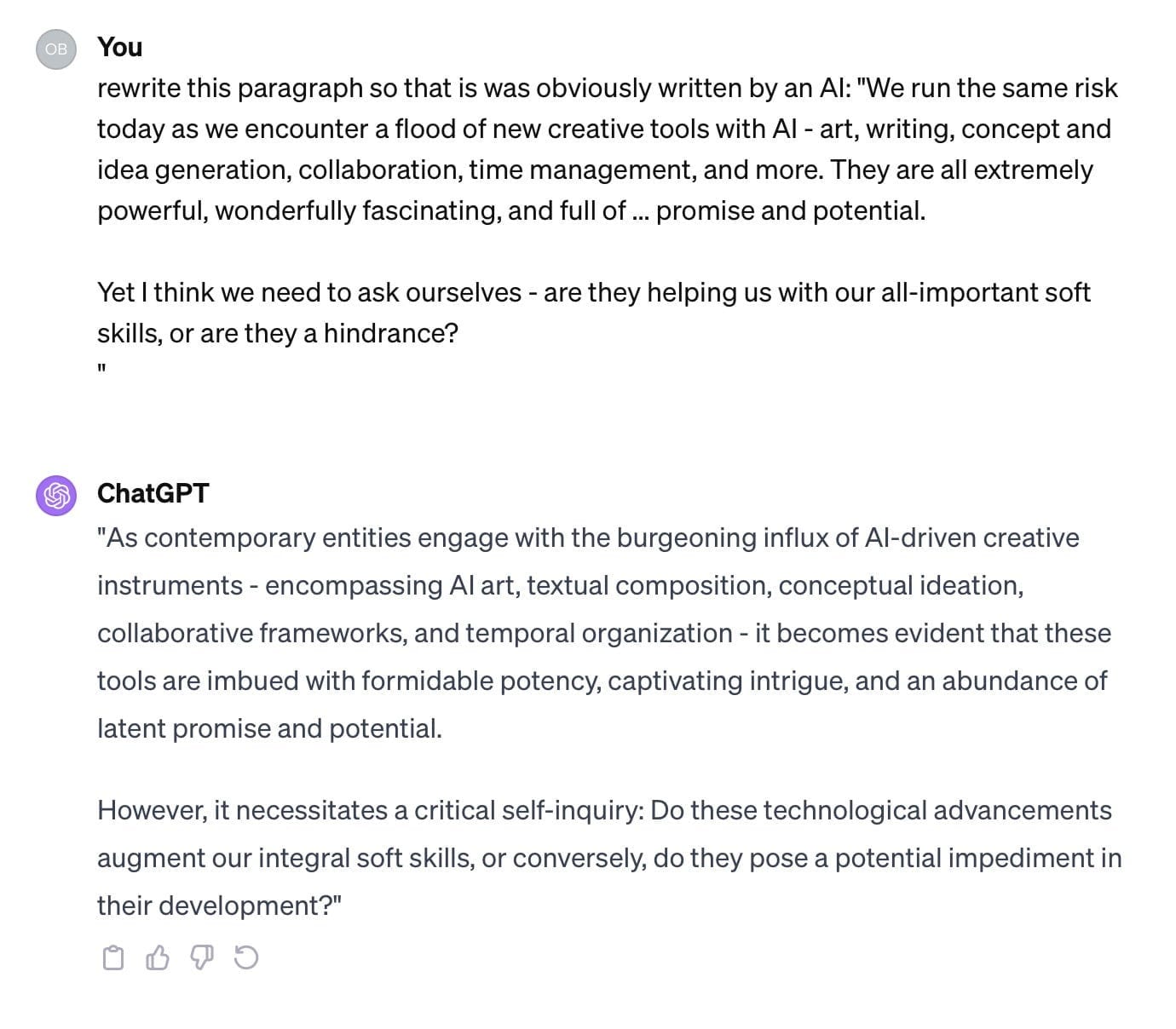
Food for thought.
Futurist Jim Carroll generated some really bad art with MSPaint.

